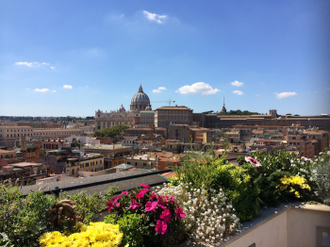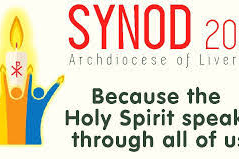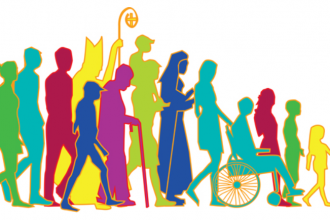Viewpoint: Why we need to talk about gender

The following article is a reworking of a talk given by Dr Gillian Paterson, Research Fellow, Heythrop College, University of London at the ACTA meeting on The Synod and the Modern World. Dr Paterson was in Rome for the beginning of the Synod, and was a panelist at the symposium to launch the book 'Catholic Women Speak'.
I have just come back from Rome, where - on Sunday morning - we dragged ourselves out of bed and set off across the city to St Peter's, carefully not forgetting the little red tickets that would let us into the Papal Mass for the opening of the Synod on the Family.
Now here is a question: How many people does St Peter's hold? Well it holds 60,000. And the square outside holds 400,000. In all, nearly half a million people. It's beautiful, I suppose: but the overall impression is less of beauty than of magnificence. And of course it's MASSIVE, full of wonderful, towering statuary - not all of it entirely suitable, you'd think: we are sitting immediately under a bemused looking marble cleric, gazing into the middle distance, apparently unaware that his head wreathed about with naked cherubs. (The ones on the other side of the aisle are at least wearing wispy little diapers.)
A voice comes over the Tannoy telling us not to clap, because it destroys the prayerfulness of the occasion: and then the procession begins. At least half of the faithful hoist themselves onto wobbly chairs, using selfie sticks as periscopes to see above each other's heads, and (in some cases) turning their backs on the cardinals in order to take photos of themselves against the backdrop of the procession.
And what do we see (apart from a sea of legs?) We see rank upon rank of grim-faced men, elderly for the most part, and dressed up to the nines in long dresses and hats. I count to 350 and then give up.
Now I was in Rome because I was a panellist in a symposium called 'Catholic Women Speak', held on the eve of the Synod to launch a book of writings by Catholic women. Before I went, people said: 'Oh how amazing to be in Rome then, there is so much going on.' And you know it was true. On the first night we went to a party where 'everyone' was talking about the Polish cleric who was scheduled to 'come out' at an LGBT event on Saturday. Anecdotes about the pope's US trip were flying around. There was an agreeable party-conference atmosphere of fringe meetings, bubbling with energy, where the so-called 'real issues' were being discussed. (And this I am NOT knocking: it's a healthy part of institutional life.) But beyond that, I'm not sure that it's one that makes much difference to outcomes.
Because, q.e.d., on Sunday morning, half a million people gather to witness that statement of entrenched institutional authority and male power. Is this how the Church moves into the modern world? Or as my conservative Catholic in-laws in Washington believe, is it just a pretence at consultation, Pope Francis having already written the apostolic exhortation that will come out of it. In short, does the Synod matter?
Well yes, whatever the formal outcome, it does matter. However flawed the process of consultation may have been, both for this and for last year's synod, the fact that it's happening at all, and also that the process has given time to talk by being such long-drawn-out one, have both given the message that issues of sex and sexuality, gender and family may be talked about (rather than just accepted with dumb obedience).
Family Planning
Where I come into this process is through the attempt to negotiate a conversation between - on the one hand - Catholic discourses on faith, fertility and family; and - on the other - the parallel process that's going on in the UN at the moment, involving the ratification of the Sustainable Development Goals (or SDG's) that are designed to shape the world's development agenda for the next 15 years. For we do not exist in a self-referential bubble. The Vatican has observer status at the United Nations, and the Roman Catholic Church is a major global player on the world stage. Whatever is decided in the hothouse atmosphere of Rome, the ripples will flow far beyond the Tiber.
So in July 2012, a global 'summit' on family planning was held in London, promoted by the British government and attended by world leaders and professionals from four continents. The first question addressed to the British Prime Minister David Cameron was: "What are 'we' (sic) going to do about the Vatican?" 'We', of course, would mean first the non-Catholics (who know best), and then any Catholics present, who would be assumed - be virtue of being there at all - to be wanting to distance themselves from official Catholic doctrine: like, for example, Melinda Gates, the well-known Catholic who was chairing the session. So, by its silence, the Church was once again allowing others to set out its stall in the international arena.
I am used to this situation, and used to being unpopular. I've worked in the field of HIV for 20 years and for 15 of those I went to every one of the UN's biennial International AIDS Conferences, where I listened to speaker after speaker slagging off the Roman Catholic Church for its positions on HIV prevention. You can argue that the whole faith sector is often scapegoated on such occasions; but believe me, it happens to Catholics in spades.
So why should it be OK to attack Catholics? Or rather, to attack Catholics in particular, and so viciously? For the Church is regularly represented as part of the problem, rather than part of the solution. Words like 'genocide' and 'murder' are used repeatedly, publicly and with impunity, by normally well-mannered people. We are not supposed to take offence, and it's regarded as 'uncool' to protest.
It's partly our own fault. The last hundred years have seen a succession of papal documents and displaying an evolving and often profound response to technological, social and economic change: a body of thought which has been informed Catholic development work and been enriched by numerous contributions from Catholic leaders and theologians. And yet, in the issues of parenthood, population and family planning, we have seen Catholic social and moral discourses being narrowed down to sterile focus on artificial methods of contraception, creating a caricature of Catholic teaching, and undermining the Church's efforts to contribute to public debate or the formation of policy at local, national and international level. This, then, becomes the narrative that we bring to the public forum.
It's is a pastoral problem, as well as one of politics, pedagogy and communication. Faithful Catholics, in all parts of the world, can feel vulnerable and exposed, as they struggle to uphold Catholic social and moral teaching. Two examples. In Namibia, a Caritas diocesan HIV trainer finds herself left out of the local ecumenical AIDS team. In Cheshire, a Catholic hospital chaplain is mysteriously never told the meeting times of the local chaplaincy team. We are letting these down by colluding in the silence that so often surrounds these issues within the Church.
My story
In the last three years, therefore, I've been part of a small group of theologians and development people (mainly European, but also from Africa, the US, the Philippines and India) trying to develop a viable Catholic discourse on faith, fertility and family. From the beginning, we sought to include in the conversation people with relevant positions in the United Nations ; it's been in that context that some of the most bruising and public stand-offs between Church and world have taken place, as for example, the big UN development Conferences of the 1990's (Beijing on Women, Cairo on population) where the RC Church (which, via the Holy See, has observer status at the UN) became a gathering point for a group of conservative religious members that included Saudi-Arabia, Qatar and Iran.
So we held a couple of colloquia at Campion Hall in Oxford and a series of workshops at Heythrop. Chatham House rules of course, and no press: Catholic institutions are often very nervous about being seen to encourage these kinds of conversation.
Following this, in recent months the Network has taken part in two international consultations, both of them aiming to address religious responses to the UN's post-2015 Sustainable Development Goals (SDGs). The first, hosted by UNFPA, took place in New York in September 2014.
The second, hosted by the Pontifical Commission for Justice and Peace, was in Rome, in May 2015. The UNFPA meeting explored the possibility of a more collaborative dialogue between religious faiths and the UN's development policies, especially in the area of sexual and reproductive health (SRH) and reproductive rights (RR). The Rome meeting, sponsored by international Catholic women's organizations and supported by the Pontifical Commission for Justice and Peace, was part of a process, initiated by the Holy See, of gathering the views of Catholic women on how its Mission to the UN should be responding to the 17 Sustainable Development Goals, coming up for endorsement later in 2015.
Unsurprisingly, at both meetings the really contentious issues were those that related to reproductive choice, women's rights and understandings of gender. All three of these concepts are widely used in development circles, albeit, sometimes, uncritically, and often without users or listeners being aware of the baggage they carry for others. For example: for at least three decades, gender analysis has been very widely employed as a sociological tool for analysing the causes of sociological and economic inequalities linked to the biological differences between male and female persons. Today, it has in some circles come simply to represent 'women's interests'. In others it is seen as an all-embracing and scary concept arousing, for some, the fear that in signing up to 'gender justice' they may be opening the door to a Trojan horse within which is hidden an unacceptable (to them) package of highly fluid understandings of gender, sexuality and family relationships, some aspects of which they might readily have endorsed, were it not for the fear that they are simultaneously signing up to this whole other hidden agenda.
Thus 'gender' has come to be used in polarised ways: either as an all-embracing 'good', or as a kind of scapegoat term, taking the blame for everything that does not fit into particular ideals of sexuality and reproduction. This polarisation is no help at all to those organizations and individuals who are trying to find helpful ways of addressing such issues as - for example - HIV prevention, maternal and infant mortality, the education of girls, often in contexts of war, poverty, climate-change and global demographic shifts.
So can the synod help?
I hope yes, but I fear no. Looking at the show of massed power on Sunday morning in St Peter's, we are tempted to conclude that the synod is actually part of the problem. I mean, why we are so stuck in what Mary McAleese, speaking at the Rome meeting, termed 'this culture of misogyny'? Why is it so difficult to see Mary as the tough, capable woman she must have been? Yes, the pope tells us that women are more important than men. The Church, he says, is female: it is, after all, 'la Chiesa'. So just which bit of 'female' is that, when we are told, in the next breath, that the conversation about women's ordination "can't be had"?
And yet, and yet. The Catholic Church has always had a gravitational pull towards that which is ideal, and this - in contextual situations - can be difficult. The best, sometimes, is the enemy of the good, but without it, how is our moral compass to be set?
So I believe we are unlikely to get a change of doctrine, because that might involve abandoning the ideal. But that doesn't (necessarily) rule out a profound re-thinking of the orientation of real live human relations. In Evangelii Gaudium, Francis makes frequent use of the phrase 'on the other hand'. In his St Peter's sermon, on the first Sunday of the Synod, he acknowledged the paradoxes we encounter in trying to live as Christians in the real world. In his opening address to the Synod, he spoke of 'the Spirit (who) speaks with the tongue of every person who lets themselves be guided by the God who always surprises, the God who reveals himself to little ones, who hides from the knowing and intelligent; the God who created the law and the Sabbath for man and not vice versa; by the God, who leaves the 99 sheep to look for the one lost sheep; the God who is always greater than our logic and our calculations.
So. We shall see. Anyway, no one can say it's boring!


















